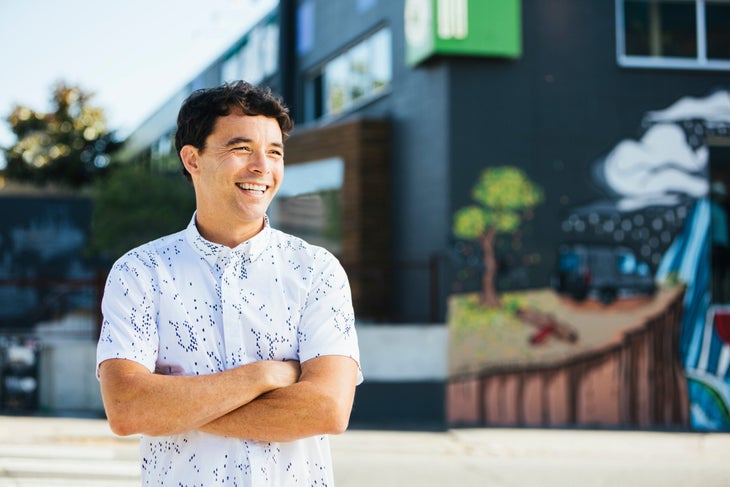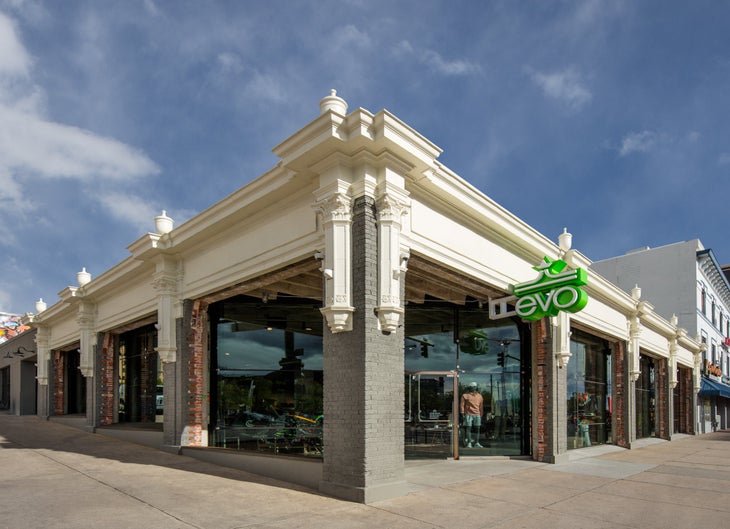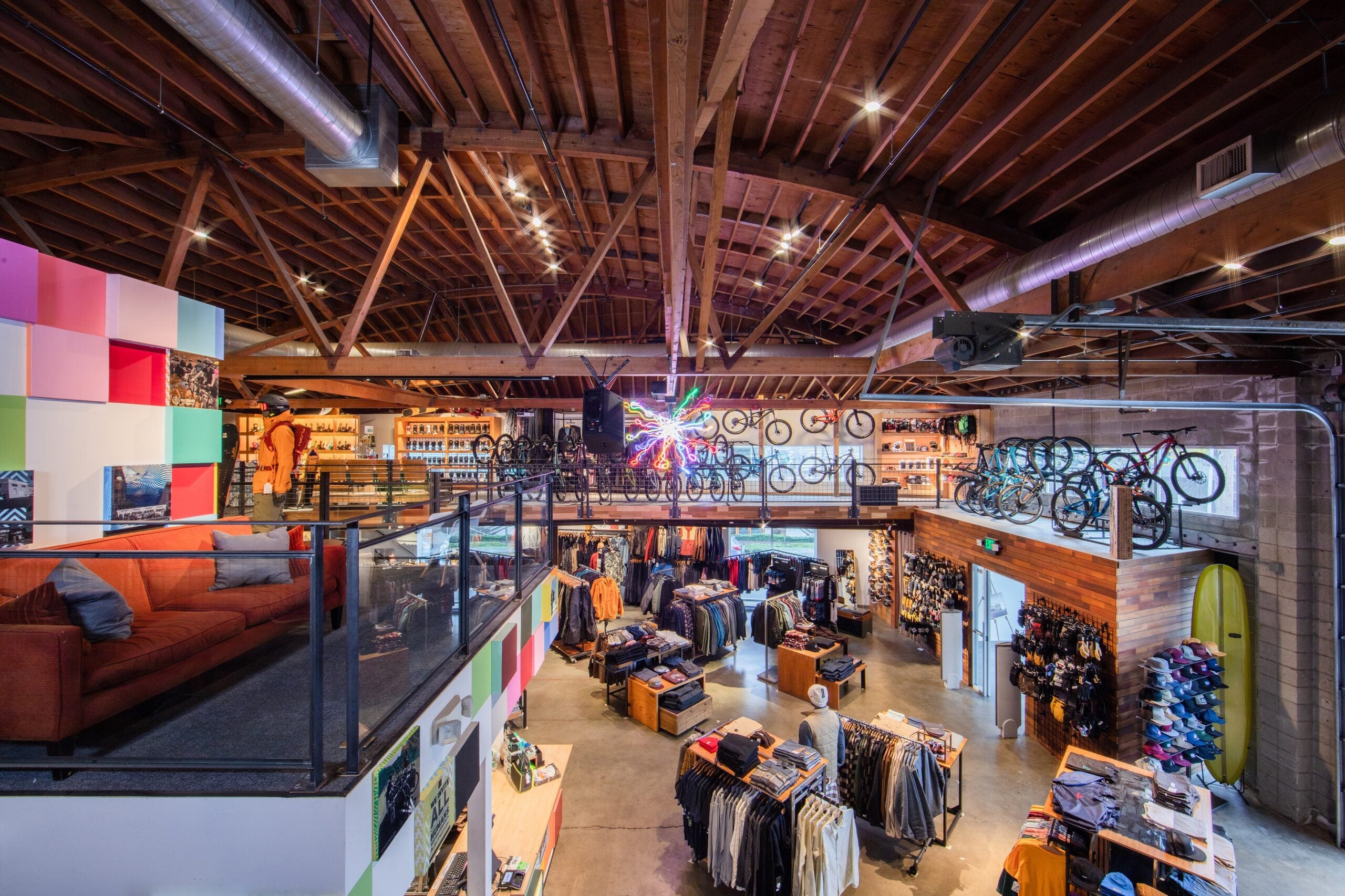Evo’s story starts like many outdoor endeavors: Bryce Phillips as a college student was slinging ski gear out of his apartments in Seattle and Whistler in the ‘90s and launched the website evogear.com in 2001. The former professional skier’s startup business merged outdoor, fashion, culture, and community into a single lifestyle brand that has grown into a major player across many industries. And this year, the business comes full circle with the opening of multiple storefronts in Whistler Blackcomb Ski Resort’s village. Along with its large online presence, evo also has locations—better known as “experience and community centers”—in Seattle, Washington; Portland, Oregon; Denver, Colorado; and in the coming months, Salt Lake City, Utah.
“It’s not a coincidence that we’re opening locations in places we all love to be,” Phillips said. Whenever we scout somewhere new, there’s always recreation woven into all of it. We don’t go to Utah and not get outside. We don’t go to any of these places and not have something baked into the calendar where we’re really getting a chance to go outside with coworkers, friends, and customers in those places.”

We’ve kept tabs on evo for years now and we finally called Phillips when he had a rare hour of downtime in Seattle to hear firsthand about his vision for the future of outdoor retail.
Evo is a mix of brick-and-mortar and online retail, but also experiences and community. How do you define what you do?
The most influential time in our history was when we opened our first store in 2005. It was really counterintuitive at the time. Everybody was like, “Why would you ever open a store? It’s all going to the web and stores are becoming irrelevant.” My response was, if you see what takes place in this space, which is far more than a store, then you’d understand. Really, it was about bringing the community together and being a place for people to share things in common. Our store was as much an event and community space as it was a retail store. Today, while we only have a handful of locations, we really emphasize that and it has been the heart and soul of the business. That translates not only to what we do physically, but also into our travel business, some of our partnerships, and as we think about the future, we really see a much bigger global opportunity to light up a suite of experiences all around the world and in iconic locations. That will manifest in ways more than just retail and travel, so we’re pretty excited.
Speaking of new locations, you just opened multiple storefronts in Whistler. Where else are you putting down stakes?
The move to Canada was small maybe geographically, but big strategically. Whistler is one of the top locations in the world for all the things we represent, not just from a sports perspective, but culturally too. It has that really cool intersection of urban and mountain and all the sports that are bullseyes for evo. Something that’s been on our radar is finding those places globally, and bringing a suite of compelling experiences to those customers—lodging, food and beverage, adventure. If we think ahead four years or so, we will definitely have a handful of new locations. We’re putting final touches on Whistler. We’ve got Salt Lake coming in a year. For us, it’s really not about quantity, it’s about location and quality. We’re not going to suddenly do some massive rollout of retail stores or hotels or anything like that. We really want to pick strategic locations where we can put a big stake in the ground and really deliver something special. What that means in the coming decade is a solid footprint across North America. But first, we’re looking overseas for other opportunities.

Tell us more about your campus opening this fall in Salt Lake City. What was your inspiration? And what can we expect to see there?
The inspiration comes from what we’ve done previously. If you look at evo Seattle, there’s two restaurants, there’s the store, and within that is an event space, a gallery, and a skatepark underneath. It’s a mini version of what we’re doing in Salt Lake City. There, we’re going much larger (130,000 square feet) and we’re bringing a mix of other uses that make the experience that are much more compelling. We’ll have a bouldering gym, a skate park, a hotel, food and beverage, and retail. We also just finalized a deal to acquire the property directly next door, where we envision a larger multi-family residential project. We don’t think you can find that anywhere right now, so we’re excited about doing something that doesn’t exist. It’s so much fun because we’re designing and curating as a reflection of what we all love. I’d love to stay in a place where I’m going to experience all these things, and where I’m going to meet all these interesting people that share that passion and those values. From my perspective, that’s the dream.
What other projects are you working on?
We’re doing everything we can to leverage our success to give back, and specifically, give back to underserved youth. The origins come from a very personal place, my own experience growing up and seeing things and having very close friends experience things that I could have never imagined. We’ve always been cause-driven, whether it’s volunteering staff hours or giving our own financial resources, but we’ve kept it very internal because we never wanted to feel like we were using it as marketing. But now that we’ve grown, there’s a bigger opportunity to leverage our reach in our communities through providing mentorships and access to outdoor experiences. If we fast forward a few years and look back, we really hope that between now and then, our cause of working with youth is synonymous with our brand.
You support other outdoor retailers—aka competitors—through the La Familia program. Why?
La Familia came from the observation that there’s a bunch of really great specialty retailers across the nation and we’re all on these different islands, whether it be a retailer in a town or evo on a website. They deliver something very special in those markets that we are not set up to do. Why aren’t we working with them? We’re sending a lot of product into markets where we don’t have a physical location, which means we’re giving customers a dead end. We’d much rather send them to the front door of a place we know they’ll get taken care of, they’ll get service work, and they’ll probably buy more product. And there’s a trust that again, one plus one equals something greater. We don’t look at it as losing a sale. We have 25 partners right now. (Alpine Shop in Vermont, Rocky Mountain Underground in Colorado, and The Ski Bum in Delaware are a few.) Then we have our existing stores. In 2019, we had almost 3,000 orders shipped to our partner stores. Each one of those orders is driving new traffic into the front door and some percent of traffic always converts. And at the end of the day, if we want specialty retail to thrive, we need customers to continue viewing those stores as pillars for their communities.
The outdoor industry as a whole is really capitalizing on experiential concepts. Do you see it as saturation or a healthy opportunity?
I see it as a rising tide. We celebrate great retail concepts, new hotels like TGR’s Continuum and LOGE, and the folks that are doing new things that observe this opportunity. There’s just so much blue sky. It’s not a zero-sum gain right now and I don’t think it’s anywhere near saturation. More than a decade ago when the economy crashed, there was lots of discussion around how retail will cease to exist and what hole the web was going to fill. But instead, that just opened up all kinds of opportunities for specialty to double down on creating experiences. The beauty is, it’s not reinventing the wheel. We can be a little bit more thoughtful about the way we design, the way we market, the way in which we message our services and it doesn’t have to be in silos. We can merge and intersect different mixed uses—outdoor, residential, lodging, food and beverage—in a complete and cohesive way. We’re just at the very beginning of where that’s headed.


